Lithium-Ion Battery Management System
Lead-Acid Battery Management System
Nickel-Metal Hydride Battery Management System
Solid-State Battery Management System
Electric Vehicles
Hybrid Vehicles
Start-Stop Systems
Elevated Cycling Applications
Passenger Vehicles
Commercial Vehicles
Two Wheelers
Heavy-Duty Trucks
Battery Cells
Battery Modules
Battery Packs
Battery Maintenance
North America
Europe
South America
Asia Pacific
Middle East and Africa
North America Outlook (USD Billion, 2019-2035)
Automotive Battery Management System Market by Technology Type
Lithium-Ion Battery Management System
Lead-Acid Battery Management System
Nickel-Metal Hydride Battery Management System
Solid-State Battery Management System
Automotive Battery Management System Market by Application Type
Electric Vehicles
Hybrid Vehicles
Start-Stop Systems
Elevated Cycling Applications
Automotive Battery Management System Market by End Use Type
Passenger Vehicles
Commercial Vehicles
Two Wheelers
Heavy-Duty Trucks
Automotive Battery Management System Market by Component Type
Battery Cells
Battery Modules
Battery Packs
Battery Maintenance
Automotive Battery Management System Market by Regional Type
US
Canada
US Outlook (USD Billion, 2019-2035)
Automotive Battery Management System Market by Technology Type
Lithium-Ion Battery Management System
Lead-Acid Battery Management System
Nickel-Metal Hydride Battery Management System
Solid-State Battery Management System
Automotive Battery Management System Market by Application Type
Electric Vehicles
Hybrid Vehicles
Start-Stop Systems
Elevated Cycling Applications
Automotive Battery Management System Market by End Use Type
Passenger Vehicles
Commercial Vehicles
Two Wheelers
Heavy-Duty Trucks
Automotive Battery Management System Market by Component Type
Battery Cells
Battery Modules
Battery Packs
Battery Maintenance
CANADA Outlook (USD Billion, 2019-2035)
Automotive Battery Management System Market by Technology Type
Lithium-Ion Battery Management System
Lead-Acid Battery Management System
Nickel-Metal Hydride Battery Management System
Solid-State Battery Management System
Automotive Battery Management System Market by Application Type
Electric Vehicles
Hybrid Vehicles
Start-Stop Systems
Elevated Cycling Applications
Automotive Battery Management System Market by End Use Type
Passenger Vehicles
Commercial Vehicles
Two Wheelers
Heavy-Duty Trucks
Automotive Battery Management System Market by Component Type
Battery Cells
Battery Modules
Battery Packs
Battery Maintenance
Europe Outlook (USD Billion, 2019-2035)
Automotive Battery Management System Market by Technology Type
Lithium-Ion Battery Management System
Lead-Acid Battery Management System
Nickel-Metal Hydride Battery Management System
Solid-State Battery Management System
Automotive Battery Management System Market by Application Type
Electric Vehicles
Hybrid Vehicles
Start-Stop Systems
Elevated Cycling Applications
Automotive Battery Management System Market by End Use Type
Passenger Vehicles
Commercial Vehicles
Two Wheelers
Heavy-Duty Trucks
Automotive Battery Management System Market by Component Type
Battery Cells
Battery Modules
Battery Packs
Battery Maintenance
Automotive Battery Management System Market by Regional Type
Germany
UK
France
Russia
Italy
Spain
Rest of Europe
GERMANY Outlook (USD Billion, 2019-2035)
Automotive Battery Management System Market by Technology Type
Lithium-Ion Battery Management System
Lead-Acid Battery Management System
Nickel-Metal Hydride Battery Management System
Solid-State Battery Management System
Automotive Battery Management System Market by Application Type
Electric Vehicles
Hybrid Vehicles
Start-Stop Systems
Elevated Cycling Applications
Automotive Battery Management System Market by End Use Type
Passenger Vehicles
Commercial Vehicles
Two Wheelers
Heavy-Duty Trucks
Automotive Battery Management System Market by Component Type
Battery Cells
Battery Modules
Battery Packs
Battery Maintenance
UK Outlook (USD Billion, 2019-2035)
Automotive Battery Management System Market by Technology Type
Lithium-Ion Battery Management System
Lead-Acid Battery Management System
Nickel-Metal Hydride Battery Management System
Solid-State Battery Management System
Automotive Battery Management System Market by Application Type
Electric Vehicles
Hybrid Vehicles
Start-Stop Systems
Elevated Cycling Applications
Automotive Battery Management System Market by End Use Type
Passenger Vehicles
Commercial Vehicles
Two Wheelers
Heavy-Duty Trucks
Automotive Battery Management System Market by Component Type
Battery Cells
Battery Modules
Battery Packs
Battery Maintenance
FRANCE Outlook (USD Billion, 2019-2035)
Automotive Battery Management System Market by Technology Type
Lithium-Ion Battery Management System
Lead-Acid Battery Management System
Nickel-Metal Hydride Battery Management System
Solid-State Battery Management System
Automotive Battery Management System Market by Application Type
Electric Vehicles
Hybrid Vehicles
Start-Stop Systems
Elevated Cycling Applications
Automotive Battery Management System Market by End Use Type
Passenger Vehicles
Commercial Vehicles
Two Wheelers
Heavy-Duty Trucks
Automotive Battery Management System Market by Component Type
Battery Cells
Battery Modules
Battery Packs
Battery Maintenance
RUSSIA Outlook (USD Billion, 2019-2035)
Automotive Battery Management System Market by Technology Type
Lithium-Ion Battery Management System
Lead-Acid Battery Management System
Nickel-Metal Hydride Battery Management System
Solid-State Battery Management System
Automotive Battery Management System Market by Application Type
Electric Vehicles
Hybrid Vehicles
Start-Stop Systems
Elevated Cycling Applications
Automotive Battery Management System Market by End Use Type
Passenger Vehicles
Commercial Vehicles
Two Wheelers
Heavy-Duty Trucks
Automotive Battery Management System Market by Component Type
Battery Cells
Battery Modules
Battery Packs
Battery Maintenance
ITALY Outlook (USD Billion, 2019-2035)
Automotive Battery Management System Market by Technology Type
Lithium-Ion Battery Management System
Lead-Acid Battery Management System
Nickel-Metal Hydride Battery Management System
Solid-State Battery Management System
Automotive Battery Management System Market by Application Type
Electric Vehicles
Hybrid Vehicles
Start-Stop Systems
Elevated Cycling Applications
Automotive Battery Management System Market by End Use Type
Passenger Vehicles
Commercial Vehicles
Two Wheelers
Heavy-Duty Trucks
Automotive Battery Management System Market by Component Type
Battery Cells
Battery Modules
Battery Packs
Battery Maintenance
SPAIN Outlook (USD Billion, 2019-2035)
Automotive Battery Management System Market by Technology Type
Lithium-Ion Battery Management System
Lead-Acid Battery Management System
Nickel-Metal Hydride Battery Management System
Solid-State Battery Management System
Automotive Battery Management System Market by Application Type
Electric Vehicles
Hybrid Vehicles
Start-Stop Systems
Elevated Cycling Applications
Automotive Battery Management System Market by End Use Type
Passenger Vehicles
Commercial Vehicles
Two Wheelers
Heavy-Duty Trucks
Automotive Battery Management System Market by Component Type
Battery Cells
Battery Modules
Battery Packs
Battery Maintenance
REST OF EUROPE Outlook (USD Billion, 2019-2035)
Automotive Battery Management System Market by Technology Type
Lithium-Ion Battery Management System
Lead-Acid Battery Management System
Nickel-Metal Hydride Battery Management System
Solid-State Battery Management System
Automotive Battery Management System Market by Application Type
Electric Vehicles
Hybrid Vehicles
Start-Stop Systems
Elevated Cycling Applications
Automotive Battery Management System Market by End Use Type
Passenger Vehicles
Commercial Vehicles
Two Wheelers
Heavy-Duty Trucks
Automotive Battery Management System Market by Component Type
Battery Cells
Battery Modules
Battery Packs
Battery Maintenance
APAC Outlook (USD Billion, 2019-2035)
Automotive Battery Management System Market by Technology Type
Lithium-Ion Battery Management System
Lead-Acid Battery Management System
Nickel-Metal Hydride Battery Management System
Solid-State Battery Management System
Automotive Battery Management System Market by Application Type
Electric Vehicles
Hybrid Vehicles
Start-Stop Systems
Elevated Cycling Applications
Automotive Battery Management System Market by End Use Type
Passenger Vehicles
Commercial Vehicles
Two Wheelers
Heavy-Duty Trucks
Automotive Battery Management System Market by Component Type
Battery Cells
Battery Modules
Battery Packs
Battery Maintenance
Automotive Battery Management System Market by Regional Type
China
India
Japan
South Korea
Malaysia
Thailand
Indonesia
Rest of APAC
CHINA Outlook (USD Billion, 2019-2035)
Automotive Battery Management System Market by Technology Type
Lithium-Ion Battery Management System
Lead-Acid Battery Management System
Nickel-Metal Hydride Battery Management System
Solid-State Battery Management System
Automotive Battery Management System Market by Application Type
Electric Vehicles
Hybrid Vehicles
Start-Stop Systems
Elevated Cycling Applications
Automotive Battery Management System Market by End Use Type
Passenger Vehicles
Commercial Vehicles
Two Wheelers
Heavy-Duty Trucks
Automotive Battery Management System Market by Component Type
Battery Cells
Battery Modules
Battery Packs
Battery Maintenance
INDIA Outlook (USD Billion, 2019-2035)
Automotive Battery Management System Market by Technology Type
Lithium-Ion Battery Management System
Lead-Acid Battery Management System
Nickel-Metal Hydride Battery Management System
Solid-State Battery Management System
Automotive Battery Management System Market by Application Type
Electric Vehicles
Hybrid Vehicles
Start-Stop Systems
Elevated Cycling Applications
Automotive Battery Management System Market by End Use Type
Passenger Vehicles
Commercial Vehicles
Two Wheelers
Heavy-Duty Trucks
Automotive Battery Management System Market by Component Type
Battery Cells
Battery Modules
Battery Packs
Battery Maintenance
JAPAN Outlook (USD Billion, 2019-2035)
Automotive Battery Management System Market by Technology Type
Lithium-Ion Battery Management System
Lead-Acid Battery Management System
Nickel-Metal Hydride Battery Management System
Solid-State Battery Management System
Automotive Battery Management System Market by Application Type
Electric Vehicles
Hybrid Vehicles
Start-Stop Systems
Elevated Cycling Applications
Automotive Battery Management System Market by End Use Type
Passenger Vehicles
Commercial Vehicles
Two Wheelers
Heavy-Duty Trucks
Automotive Battery Management System Market by Component Type
Battery Cells
Battery Modules
Battery Packs
Battery Maintenance
SOUTH KOREA Outlook (USD Billion, 2019-2035)
Automotive Battery Management System Market by Technology Type
Lithium-Ion Battery Management System
Lead-Acid Battery Management System
Nickel-Metal Hydride Battery Management System
Solid-State Battery Management System
Automotive Battery Management System Market by Application Type
Electric Vehicles
Hybrid Vehicles
Start-Stop Systems
Elevated Cycling Applications
Automotive Battery Management System Market by End Use Type
Passenger Vehicles
Commercial Vehicles
Two Wheelers
Heavy-Duty Trucks
Automotive Battery Management System Market by Component Type
Battery Cells
Battery Modules
Battery Packs
Battery Maintenance
MALAYSIA Outlook (USD Billion, 2019-2035)
Automotive Battery Management System Market by Technology Type
Lithium-Ion Battery Management System
Lead-Acid Battery Management System
Nickel-Metal Hydride Battery Management System
Solid-State Battery Management System
Automotive Battery Management System Market by Application Type
Electric Vehicles
Hybrid Vehicles
Start-Stop Systems
Elevated Cycling Applications
Automotive Battery Management System Market by End Use Type
Passenger Vehicles
Commercial Vehicles
Two Wheelers
Heavy-Duty Trucks
Automotive Battery Management System Market by Component Type
Battery Cells
Battery Modules
Battery Packs
Battery Maintenance
THAILAND Outlook (USD Billion, 2019-2035)
Automotive Battery Management System Market by Technology Type
Lithium-Ion Battery Management System
Lead-Acid Battery Management System
Nickel-Metal Hydride Battery Management System
Solid-State Battery Management System
Automotive Battery Management System Market by Application Type
Electric Vehicles
Hybrid Vehicles
Start-Stop Systems
Elevated Cycling Applications
Automotive Battery Management System Market by End Use Type
Passenger Vehicles
Commercial Vehicles
Two Wheelers
Heavy-Duty Trucks
Automotive Battery Management System Market by Component Type
Battery Cells
Battery Modules
Battery Packs
Battery Maintenance
INDONESIA Outlook (USD Billion, 2019-2035)
Automotive Battery Management System Market by Technology Type
Lithium-Ion Battery Management System
Lead-Acid Battery Management System
Nickel-Metal Hydride Battery Management System
Solid-State Battery Management System
Automotive Battery Management System Market by Application Type
Electric Vehicles
Hybrid Vehicles
Start-Stop Systems
Elevated Cycling Applications
Automotive Battery Management System Market by End Use Type
Passenger Vehicles
Commercial Vehicles
Two Wheelers
Heavy-Duty Trucks
Automotive Battery Management System Market by Component Type
Battery Cells
Battery Modules
Battery Packs
Battery Maintenance
REST OF APAC Outlook (USD Billion, 2019-2035)
Automotive Battery Management System Market by Technology Type
Lithium-Ion Battery Management System
Lead-Acid Battery Management System
Nickel-Metal Hydride Battery Management System
Solid-State Battery Management System
Automotive Battery Management System Market by Application Type
Electric Vehicles
Hybrid Vehicles
Start-Stop Systems
Elevated Cycling Applications
Automotive Battery Management System Market by End Use Type
Passenger Vehicles
Commercial Vehicles
Two Wheelers
Heavy-Duty Trucks
Automotive Battery Management System Market by Component Type
Battery Cells
Battery Modules
Battery Packs
Battery Maintenance
South America Outlook (USD Billion, 2019-2035)
Automotive Battery Management System Market by Technology Type
Lithium-Ion Battery Management System
Lead-Acid Battery Management System
Nickel-Metal Hydride Battery Management System
Solid-State Battery Management System
Automotive Battery Management System Market by Application Type
Electric Vehicles
Hybrid Vehicles
Start-Stop Systems
Elevated Cycling Applications
Automotive Battery Management System Market by End Use Type
Passenger Vehicles
Commercial Vehicles
Two Wheelers
Heavy-Duty Trucks
Automotive Battery Management System Market by Component Type
Battery Cells
Battery Modules
Battery Packs
Battery Maintenance
Automotive Battery Management System Market by Regional Type
Brazil
Mexico
Argentina
Rest of South America
BRAZIL Outlook (USD Billion, 2019-2035)
Automotive Battery Management System Market by Technology Type
Lithium-Ion Battery Management System
Lead-Acid Battery Management System
Nickel-Metal Hydride Battery Management System
Solid-State Battery Management System
Automotive Battery Management System Market by Application Type
Electric Vehicles
Hybrid Vehicles
Start-Stop Systems
Elevated Cycling Applications
Automotive Battery Management System Market by End Use Type
Passenger Vehicles
Commercial Vehicles
Two Wheelers
Heavy-Duty Trucks
Automotive Battery Management System Market by Component Type
Battery Cells
Battery Modules
Battery Packs
Battery Maintenance
MEXICO Outlook (USD Billion, 2019-2035)
Automotive Battery Management System Market by Technology Type
Lithium-Ion Battery Management System
Lead-Acid Battery Management System
Nickel-Metal Hydride Battery Management System
Solid-State Battery Management System
Automotive Battery Management System Market by Application Type
Electric Vehicles
Hybrid Vehicles
Start-Stop Systems
Elevated Cycling Applications
Automotive Battery Management System Market by End Use Type
Passenger Vehicles
Commercial Vehicles
Two Wheelers
Heavy-Duty Trucks
Automotive Battery Management System Market by Component Type
Battery Cells
Battery Modules
Battery Packs
Battery Maintenance
ARGENTINA Outlook (USD Billion, 2019-2035)
Automotive Battery Management System Market by Technology Type
Lithium-Ion Battery Management System
Lead-Acid Battery Management System
Nickel-Metal Hydride Battery Management System
Solid-State Battery Management System
Automotive Battery Management System Market by Application Type
Electric Vehicles
Hybrid Vehicles
Start-Stop Systems
Elevated Cycling Applications
Automotive Battery Management System Market by End Use Type
Passenger Vehicles
Commercial Vehicles
Two Wheelers
Heavy-Duty Trucks
Automotive Battery Management System Market by Component Type
Battery Cells
Battery Modules
Battery Packs
Battery Maintenance
REST OF SOUTH AMERICA Outlook (USD Billion, 2019-2035)
Automotive Battery Management System Market by Technology Type
Lithium-Ion Battery Management System
Lead-Acid Battery Management System
Nickel-Metal Hydride Battery Management System
Solid-State Battery Management System
Automotive Battery Management System Market by Application Type
Electric Vehicles
Hybrid Vehicles
Start-Stop Systems
Elevated Cycling Applications
Automotive Battery Management System Market by End Use Type
Passenger Vehicles
Commercial Vehicles
Two Wheelers
Heavy-Duty Trucks
Automotive Battery Management System Market by Component Type
Battery Cells
Battery Modules
Battery Packs
Battery Maintenance
MEA Outlook (USD Billion, 2019-2035)
Automotive Battery Management System Market by Technology Type
Lithium-Ion Battery Management System
Lead-Acid Battery Management System
Nickel-Metal Hydride Battery Management System
Solid-State Battery Management System
Automotive Battery Management System Market by Application Type
Electric Vehicles
Hybrid Vehicles
Start-Stop Systems
Elevated Cycling Applications
Automotive Battery Management System Market by End Use Type
Passenger Vehicles
Commercial Vehicles
Two Wheelers
Heavy-Duty Trucks
Automotive Battery Management System Market by Component Type
Battery Cells
Battery Modules
Battery Packs
Battery Maintenance
Automotive Battery Management System Market by Regional Type
GCC Countries
South Africa
Rest of MEA
GCC COUNTRIES Outlook (USD Billion, 2019-2035)
Automotive Battery Management System Market by Technology Type
Lithium-Ion Battery Management System
Lead-Acid Battery Management System
Nickel-Metal Hydride Battery Management System
Solid-State Battery Management System
Automotive Battery Management System Market by Application Type
Electric Vehicles
Hybrid Vehicles
Start-Stop Systems
Elevated Cycling Applications
Automotive Battery Management System Market by End Use Type
Passenger Vehicles
Commercial Vehicles
Two Wheelers
Heavy-Duty Trucks
Automotive Battery Management System Market by Component Type
Battery Cells
Battery Modules
Battery Packs
Battery Maintenance
SOUTH AFRICA Outlook (USD Billion, 2019-2035)
Automotive Battery Management System Market by Technology Type
Lithium-Ion Battery Management System
Lead-Acid Battery Management System
Nickel-Metal Hydride Battery Management System
Solid-State Battery Management System
Automotive Battery Management System Market by Application Type
Electric Vehicles
Hybrid Vehicles
Start-Stop Systems
Elevated Cycling Applications
Automotive Battery Management System Market by End Use Type
Passenger Vehicles
Commercial Vehicles
Two Wheelers
Heavy-Duty Trucks
Automotive Battery Management System Market by Component Type
Battery Cells
Battery Modules
Battery Packs
Battery Maintenance
REST OF MEA Outlook (USD Billion, 2019-2035)
Automotive Battery Management System Market by Technology Type
Lithium-Ion Battery Management System
Lead-Acid Battery Management System
Nickel-Metal Hydride Battery Management System
Solid-State Battery Management System
Automotive Battery Management System Market by Application Type
Electric Vehicles
Hybrid Vehicles
Start-Stop Systems
Elevated Cycling Applications
Automotive Battery Management System Market by End Use Type
Passenger Vehicles
Commercial Vehicles
Two Wheelers
Heavy-Duty Trucks
Automotive Battery Management System Market by Component Type
Battery Cells
Battery Modules
Battery Packs
Battery Maintenance
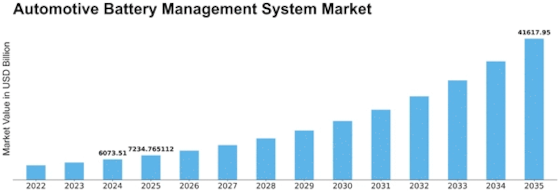


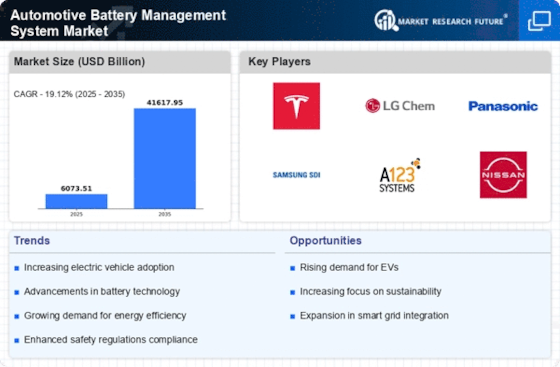
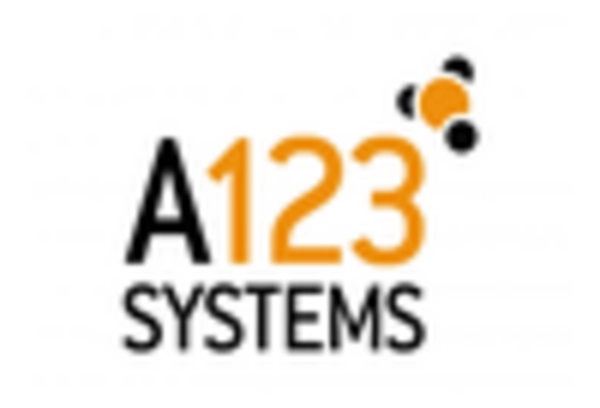
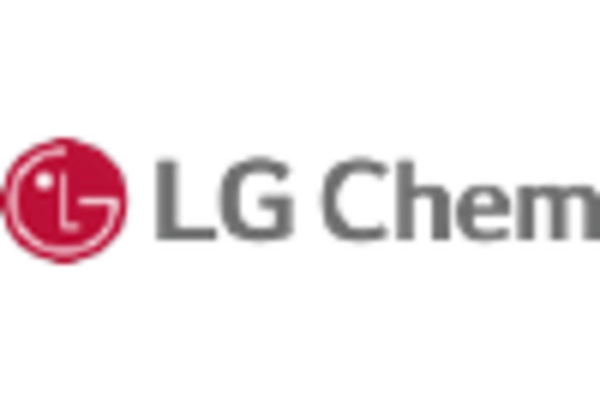
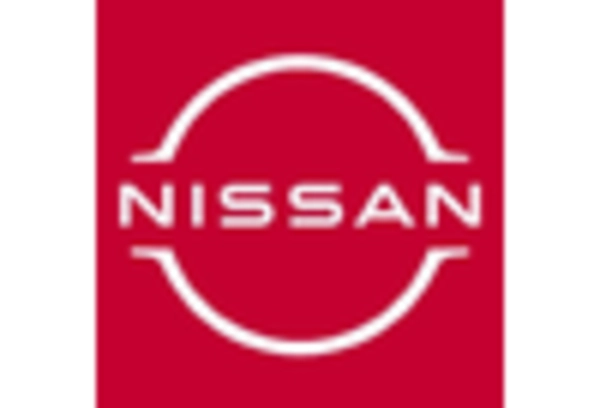












Leave a Comment